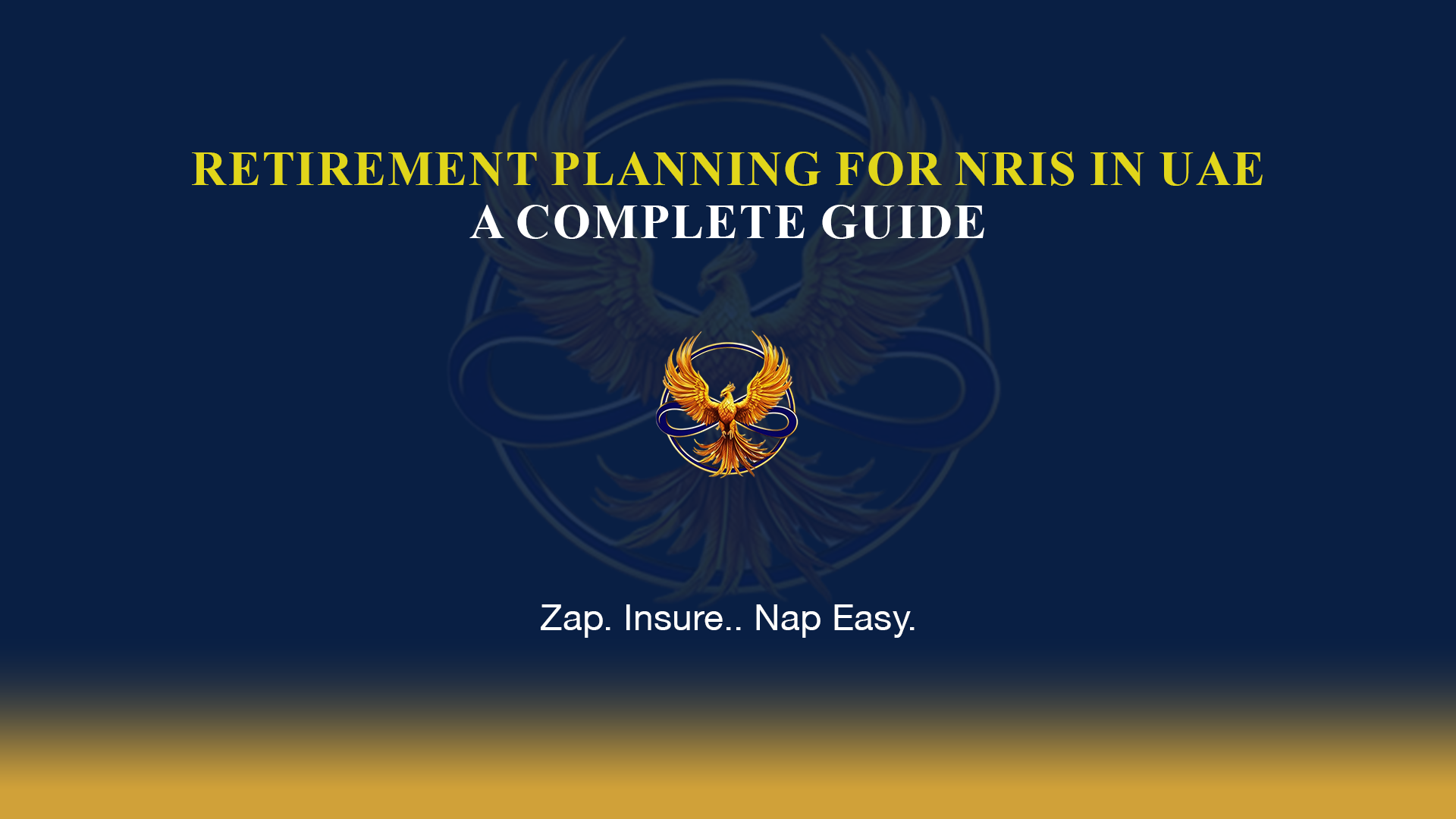
© insurewithjayesh | All Rights Reserved

Have you ever wondered what your financial life will look like once you retire? For many people, retirement planning is something that often gets postponed while chasing career growth and enjoying the country’s tax-free income. However, the reality is that the UAE does not offer a government-backed pension or social security system for emigrants. Combined with the region’s high cost of living and uncertain job or visa stability, it becomes essential to create a well-thought-out retirement plan.
Proper retirement planning for NRIs in UAE helps you build a secure financial foundation for your future. It ensures that you can maintain your desired lifestyle, support your family, and achieve true financial independence after your working years. By starting early, investing wisely, and planning strategically, you can look forward to a comfortable, stress-free retirement, whether you choose to stay in the UAE or return home with peace of mind.
Living and working in the UAE brings great opportunities but also unique retirement challenges:
Early planning is key for a comfortable retirement:
Starting pension planning as early as your 20s or 30s is ideal. Thanks to compound interest, even small investments grow significantly over time. For example, saving from age 25 can nearly double your retirement fund compared to starting at 35. To make the most of your plan, consult the best insurance advisor for NRIs in UAE who can help tailor the right strategy for you.
It’s never too early to begin saving for your future. One of the easiest ways to build a solid nest egg is by setting aside a fixed percentage of your income every month. You can also consider systematic investment plans (SIPs) that allow you to invest small amounts regularly, helping your money grow steadily over time. Consistency is key. For retirement savings for NRIs in UAE, starting early and staying disciplined can make a huge difference. Don’t wait take control of your financial future today by creating a saving habit that works for you.
A disciplined savings plan offers several important benefits that can help secure your financial future:
Overall, a regular savings plan creates a strong financial foundation, making retirement more comfortable and less stressful. Starting early and staying consistent is key to maximizing these benefits.
When it comes to retirement planning for NRIs in UAE, understanding the available options is crucial. Unlike many countries, the UAE does not have a government pension system for expatriates, so NRIs need to rely on private retirement schemes.
Common options include:
To enrol, start by assessing your retirement goals and risk tolerance. Next, choose a plan that fits your needs and budget. You can approach insurance companies or financial advisors specializing in NRI investments for guidance. After selecting a plan, set up regular contributions monthly or quarterly to build your fund steadily.
It’s also important to review your investments periodically to adjust your strategy based on changing market conditions or personal goals. With careful retirement planning for NRIs in UAE, you can secure a financially comfortable and stress-free retirement.
Estimating how much to save for retirement insurance depends on several factors like your current lifestyle, expected expenses after retirement, inflation, and potential returns on your investments. A simple guideline is to calculate your expected monthly expenses during retirement, adjust them for inflation, and then multiply by the number of years you expect to live post-retirement. For example, if you expect to need 60-70% of your current income and plan for 20-30 years of retirement, you can estimate your retirement corpus accordingly.
It’s important to factor in inflation, as costs tend to rise over time, and expected returns, which can help your savings grow. Because every individual’s situation is different, consulting the best insurance advisor for NRIs in UAE can provide personalized guidance. They can help create a tailored retirement plan that balances your needs, risk appetite, and financial goals to ensure you save the right amount for a secure future.
Avoid these mistakes by planning smartly and consulting the best insurance advisor for NRIs in UAE.
Early retirement planning is essential for NRIs to ensure financial security and a comfortable future. The sooner you start, the more time your investments have to grow, helping you avoid stress later in life. Take actionable steps today by consulting a trusted financial advisor who understands your unique needs. At Zenix Advisory, we specialize in helping NRIs in the UAE create personalized retirement plans tailored to their goals. Don’t wait—secure your tomorrow by planning today.
1) Why is hiring a financial advisor important?
Because it saves you from expensive mistakes. It aligns UAE and India investments, optimizes for tax, and ensures your plan stays disciplined. Chasing returns alone doesn’t work—structure does.
2) At what age should NRIs in the UAE start planning for retirement?
The best time is your first paycheck. But if you’re late, start now with higher contributions and sensible risk-taking.
3) Can NRIs invest in retirement funds or pension schemes in the UAE?
Yes—through employer savings plans, National Bonds, and international wrappers. Combine them with Indian options like NPS and mutual funds.
4) Are there tax benefits on retirement savings for NRIs in the UAE?
The UAE has no income tax for individual earnings. In India, certain schemes like NPS have tax advantages. The real benefit in the UAE comes from compounding without tax leakage.
5) What documents are required for NRI retirement planning in the UAE?
Keep your passport, Emirates ID, visa, PAN (if any), address proof, salary slips, bank/investment statements, and nomination details. Update yearly.
6) How does retirement planning differ for NRIs in the UAE compared to other countries?
There’s no state pension, and you need portable solutions. Plans must balance high UAE living costs with long-term stability in India or globally.
7) What are common mistakes NRIs in the UAE make when planning for retirement?
Delaying planning, keeping idle cash, buying high-fee products, and ignoring tax rules. Regular reviews solve most of these.
8) Do NRIs in the UAE have to pay taxes on their retirement income?
Not in the UAE currently. In India, taxation depends on residency status and income type. Planning withdrawals carefully avoids surprises.
© insurewithjayesh | All Rights Reserved